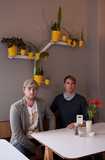Neighbourhood Market / Cape town
Go up market
Monocle meets the two visionaries who have shown that the fortunes of an entire neighbourhood can be transformed simply by setting up a weekly market selling local produce.

Neither of them were born in the city but Cameron Munro from Harare and Justin Rhodes from New York have helped transform one of Cape Town’s most neglected neighbourhoods. Their key to urban transformation? A market.
In 2006, Rhodes and Munro opened the Neighbourgoods Market in the city’s then-run-down Woodstock area. Now, this Saturday gathering at the Old Biscuit Mill pulls in 130 producers (as well as 2,000 hungry Capetonians), including cheese and wine makers, organic farmers and artisan butchers. There’s now also a Designer Market and Kindergoods Market for children.
Since their arrival, Woodstock has been changed dramatically: it is now home to the city’s top 10 art galleries. Cape Town council has also recognised it as a Central City Improvement District and has beefed up security in the area, sadly key in this city. Rhodes and Munro are keen to see the lessons they’ve learnt applied in other cities with down-at-heel districts. The rule of the markets has rarely looked so appealing.
Q&A
Justin Rhodes and Cameron Munro
Founders
Why did you start the Neighbourgoods Market?
JR: We noticed that Cape Town had a growing food culture as well as agricultural areas and winelands just outside the city. There were speciality producers looking for an outlet to sell their goods and we wanted to create a high-quality weekly platform for them to do this. We were also interested in the community aspect of a market, creating a place where locals could meet and gather on Saturdays, become more educated about what they buy, eat by going to the source, and collectively support their local producers. Plus we really wanted to revive and reinvent the public market as a civic institution.
Why do you think public markets are important?
CM: The market concept has been around for generations. Historically it played an important role in cities and neighbourhoods. We wanted to update it so that it appealed to our contemporaries as well.
Our generation [aged 25 to 35] is the next big consumer group and we feel it is important to educate them about the importance of provenance and shopping locally. This model of retail is the best sort of experience that links the producer with the consumer. For small businesses and micro enterprises that are just starting out it is also an important way for them to make direct sales.
Why did you open it in Woodstock, an old industrial neighbourhood?
JR: We are passionate about urban regeneration and also about setting up initiatives that bring people to areas of the city they wouldn’t normally go to. The market has transformed the area. Woodstock has filled up with galleries, design studios, small creative offices and shops.
Where do local suppliers fit in?
JR: We believe you must always start in your own backyard and support those around you, whether it is a local craftsman, farmer or the corner store.
How do you select who trades at the market?
CM: We carefully research each trader. In the end it’s really about quality. Of course we arrange tastings and farm visits and it is imperative that each trader is present at the market on Saturday.
What is the state of retail in South Africa?
JR: We find it’s quite stale and very traditional, which is why I think we’ve had such success with Neighbourgoods. People here are looking for a stronger experience and something new.
Could the concept work in other cities?
CM: For sure. We think it is a universal model but again context is very important. Currently we are looking to set up something similar in Johannesburg and we are also starting something called “friendchising” – that’s kind of like franchising but more of a partnership and less commercial – with partners in our other cities but this is just in development stage.
Does the market have any environmental ambitions?
JR: We have a recycling depot on-site where most of the organic food waste is donated to local farms or mulched into organic fertiliser for local community garden initiatives. We are also looking to set up our own community garden later this year and will start an urban greening initiative in Woodstock by planting trees along the main roads.
What is Cape Town lacking as a city?
CM: A proper daily fish market. We live right next to the ocean but it is still hard to buy fresh seafood to cook at home on a daily basis. It drives us crazy.
Justin Rhodes
1979
Born in New York
2003
Graduates Hunter College (NYC) with BA plus Special Masters in Commu-nity Leadership. Moves to Cape Town.
2004
Works for various non-profit projects.
2005
Starts Whatiftheworld and organises workshops for young designers and artists. Launches a very small version of Neighbourgoods Market.
2006
Moves Whatiftheworld to Woodstock. Starts Neighbourgoods Market in the Old Biscuit Mill.
Cameron Munro
1981
Born in Harare, Zimbabwe
2002
Takes a gap year to travel and bases himself in New York.
2004
Graduates from University of Cape Town with a business/marketing degree.
2005
Starts Whatiftheworld together with Rhodes.
2009
Sets up Superette, a café near the market. Hosts monthly supper clubs using seasonal ingredients from market traders and local suppliers.


